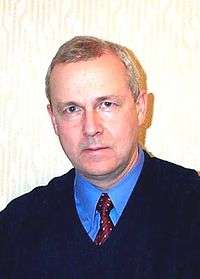Victor Krylov
| Victor Krylov | |
|---|---|
 | |
| Born | Tambov, Russia |
| Nationality | United Kingdom |
| Fields | Acoustics, vibration |
| Institutions | Loughborough University |
| Alma mater | Moscow State University |
| Notable awards |
Lenin Komsomol Prize (1984) Rayleigh Medal (2000) |
Victor Krylov (Russian: Виктор Владимирович Крылов) is a Russian-born British academic. He is professor of acoustics and vibration at Loughborough University.
Biography
Krylov was born in Tambov, Russia. He received his PhD in physics and mathematics (specialisation in acoustics) from the Moscow State University in 1981. In 1989 he received his DSc in the same disciplines from the Moscow State University and the Higher Attestation Commission of the former USSR. He then pursued an academic career in various universities leading to his present position at Loughborough University.
Krylov has been awarded the Lenin Komsomol Prize in 1984 and the Rayleigh Medal in 2000.[1]
Work
Krylov carried out research into Rayleigh waves, including their propagation at hypersonic frequencies, their propagation and scattering on curved and statistically rough surfaces.[2] Further topics include acoustic emission from cracks developing in brittle solids, laser generation of sound in solids, localised vibrations propagating along edges of elastic wedges.
From 1993 Krylov worked in the UK, conducting research on ground vibrations generated by railway trains and by road vehicles. His prediction of ground vibration boom from high-speed trains travelling at speeds larger than Rayleigh wave velocity in the supporting ground has received public attention in connection with the proposed High Speed Rail system HS2 in the UK.[3][4]
Krylov predicted the existence of localised elastic waves in immersed solid wedges and proposed to use them for wave-like aquatic propulsion of marine vessels. He suggests using electric motors or shape-memory materials to emulate the propulsion of some fish, such as stingrays, a process less efficient but quieter than conventional propellers.[5] He also investigated the method of damping structural vibrations based on the "acoustic black hole effect" for flexural waves propagating in plates of variable local thickness.[2]
Krylov has published several books and numerous papers on topics related to acoustics and vibration.[2]
Books
- Krasil'nikov, V.A. and Krylov, V.V. (1984), Introduction to Physical Acoustics, Nauka, Moscow (in Russian).
- Krasil'nikov, V.A. and Krylov, V.V. (1985), Surface Acoustic Waves, Znanie, Moscow (in Russian).
- Krylov, V.V. (1989), Basic Principles of Sound Radiation and Scattering, Moscow University Press, Moscow (in Russian).
- Biryukov, S.V., Gulyaev, Y.V., Krylov, V.V. and Plessky, V.P. (1995), Surface Acoustic Waves in Inhomogeneous Media, Springer-Verlag, Berlin.
- Krylov, V.V. (ed) (2001), Noise and Vibration from High Speed Trains, Thomas Telford, London.
References
| Wikimedia Commons has media related to Victor Krylov (physicist). |
- ↑ "Professional profile webpage of Victor Krylov". Loughborough University website. Retrieved 2014-07-11.
- 1 2 3 "List of publications by Victor Krylov". Loughborough University website.
- ↑ Rayney, David (15 May 2011). "The Application and Effect of the Rayleigh Wave Speed Principle on High Speed Rail travel.". The UK Parliament website. Retrieved 1 August 2014.
- ↑ Gilligan, Andrew (2012-02-19). "High speed rail link 'at risk of derailment' because of 225mph trains". The Telegraph. Retrieved 1 August 2014.
- ↑ Marks, Paul (5 July 2010). "From sea to sky: Submarines that fly". New Scientist (2767). Retrieved 1 August 2014.